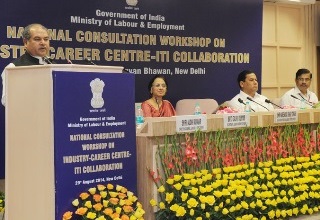Role of states in skill development schemes is vital
Updated: Aug 29, 2014 03:37:48pm

“The one common thing across almost all these Schemes is the important role played by the State Governments - it is the States and their functionaries, who implement all these Schemes,” he said, speaking at the National Consultation Workshop on ‘Industry- Career Centre- ITI Collaboration’ here.
He called for regular feedback from the states. Based on earlier feedback with regard to norms for costs, duration of training, outcomes, monitoring requirements etc, the committee set up to rationalize all these schemes was formed. The committee would help in the convergence of norms across the various central schemes for skill development, he said.
“But while arriving at these norms, the different situations prevailing in the States has also to be borne in mind. So, all the North Eastern States, the hill States, and other geographies that pose challenging situations for skill development will be treated differently so that our citizens living in these areas are nor deprived of the benefits of skill development,” Sonowal said.
Currently, the Government of India's skill development efforts are being carried out through 20 separate Ministries and Departments, all of whom implement over 70 Schemes, that either exclusively, or partially, have skill development components embedded within them.
The Minister pointed out that the ultimate objective of all skill development activities is to ensure that the youth of this country are gainfully employed. “Hence, we will ensure that all skill development Schemes in the country focus on outcomes; and performance needs to be measured in terms of percentage of persons actually placed in wage or self-employment,” he said.
Sonowal said it would be in keeping with the principles upon which the National Skills Qualification Framework is based.
He suggested that all initiatives being taken, such as model ITIs and career centres, work towards this overarching objective.
The Minister also emphasized the importance of independent and good quality third party certification to be adopted by institutes imparting skill development programmes as a means to bring accountability and regulation over training. Having a more accountable certificate also promotes professional and personal development of individuals, he said.
However, he pointed out that the success of all these initiatives and efforts ultimately depends upon the States, as they have the ultimate authority to implement them.
“The government realizes the vital role that States will have to play to make Skill India turn into a reality. I am aware that State Skill Development Missions (SSDMs) have been created in most of the States, but are working with differing degrees of authority, responsibility and therefore, effectiveness, in various States. Just as we now have a Department for Skill Development at the centre, I urge all of you to empower your State Skill Development Missions so that they are able to operate as effective nodal bodies which can anchor the skill development agenda in your State,” he said.
The Ministry has offered capacity building assistance to the State Skill Development Missions, and ten states that agreed to accept this, have already been identified he said.
Sonowal said that the magnitude of the skill development task is huge, and the same cannot be addressed through government funding alone. “Industry is an essential partner in the skill development agenda, and there is need to encourage greater participation from the private sector. Each one of us has to play a role in this,” he said.
Earlier, the Prime Minister had identified skilling our youth as one of the key areas for development, and the Skill India Programme aims to address the employability issue by initiating a multi-skills development programme in a mission mode with focus on job creation and entrepreneurship, in both rural and urban areas covering all socio-economic groups of the population.
Further, the Ministry of Labour and Employment has launched various initiatives to meet the skill needs which include setting up of model career centres supported by a National Career Service portal, assisting each State in developing one ITI as a model ITI, and finding new avenues to interact with industry, such as through flexi-MOUs. (KNN/ES)












